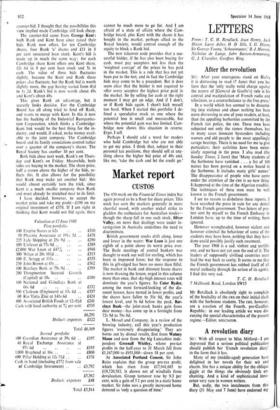Market report
CUSTOS
The 450 mark on the Financial Times index has again proved to be a floor for share prices. This week has seen the markets generally in more cheerful mood, with another nickel strike to gladden the enthusiasts for Australian stocks— though the sharp fall in one such stock, Silver Valley, on news that dealings were under in- vestigation in Australia underlines the need to discriminate.
British government stocks drift along, lower and lower in the water: War Loan is just one eighth of a point above its worst price ever. The Basle meetings of central bankers was thought to work out well for sterling, which has been in improved form; but the response to this in gilt-edged has been no more than fitful. The market in bank and discount house shares is now drawing the lesson, urged in this column more than once, that sky-high interest rates will dominate the year's figures. So Cater Ryder, among the most forward-looking of the dis- count houses, have turned in lower profits, and the shares have fallen to 51s 9d, the year's lowest level, and 9s 6d below the peak. Bar- clays Bank—the joint-stock banks gain from dear money—has come up in a fortnight from 72s 9d to 79s 9d.
L. Messel and Company, in a review of the brewing industry, call this year's production figures 'extremely disappointing.' They are borne out by dismal results, first from Watney Mann and now from the big Lancashire inde- pendent Greenall Whitley, whose pre-tax profits in the half-year to 31 March fell from £1,167,000 to f951,000—down 18 per cent.
At Associated Portland Cement, Sir John Reiss explains that the group pre-tax profit, which has risen from £17,941,685 to £19,720,583, is shown net of windfalls from devaluation. Group turnover rose by 9.3 per cent, with a gain of 5.1 per cent in a static home market. Sir John sees a greatly increased home demand as 'only a question of time.'










































 Previous page
Previous page